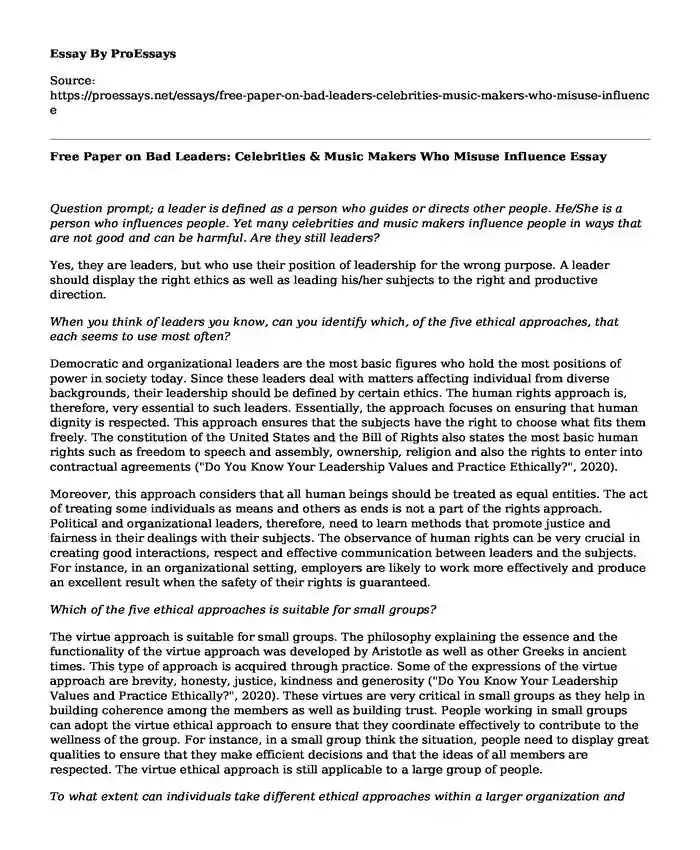Question prompt; a leader is defined as a person who guides or directs other people. He/She is a person who influences people. Yet many celebrities and music makers influence people in ways that are not good and can be harmful. Are they still leaders?
Yes, they are leaders, but who use their position of leadership for the wrong purpose. A leader should display the right ethics as well as leading his/her subjects to the right and productive direction.
When you think of leaders you know, can you identify which, of the five ethical approaches, that each seems to use most often?
Democratic and organizational leaders are the most basic figures who hold the most positions of power in society today. Since these leaders deal with matters affecting individual from diverse backgrounds, their leadership should be defined by certain ethics. The human rights approach is, therefore, very essential to such leaders. Essentially, the approach focuses on ensuring that human dignity is respected. This approach ensures that the subjects have the right to choose what fits them freely. The constitution of the United States and the Bill of Rights also states the most basic human rights such as freedom to speech and assembly, ownership, religion and also the rights to enter into contractual agreements ("Do You Know Your Leadership Values and Practice Ethically?", 2020).
Moreover, this approach considers that all human beings should be treated as equal entities. The act of treating some individuals as means and others as ends is not a part of the rights approach. Political and organizational leaders, therefore, need to learn methods that promote justice and fairness in their dealings with their subjects. The observance of human rights can be very crucial in creating good interactions, respect and effective communication between leaders and the subjects. For instance, in an organizational setting, employers are likely to work more effectively and produce an excellent result when the safety of their rights is guaranteed.
Which of the five ethical approaches is suitable for small groups?
The virtue approach is suitable for small groups. The philosophy explaining the essence and the functionality of the virtue approach was developed by Aristotle as well as other Greeks in ancient times. This type of approach is acquired through practice. Some of the expressions of the virtue approach are brevity, honesty, justice, kindness and generosity ("Do You Know Your Leadership Values and Practice Ethically?", 2020). These virtues are very critical in small groups as they help in building coherence among the members as well as building trust. People working in small groups can adopt the virtue ethical approach to ensure that they coordinate effectively to contribute to the wellness of the group. For instance, in a small group think the situation, people need to display great qualities to ensure that they make efficient decisions and that the ideas of all members are respected. The virtue ethical approach is still applicable to a large group of people.
To what extent can individuals take different ethical approaches within a larger organization and still be effective?
The answer is yes. Organizations can still be effective after adopting various ethical approaches depending on the leadership strategies of the organizations. In large organizations, leadership is viewed as a way to foster ethical conducts in all either profit or non-profit organizations. The extent to which individuals in an organization take different ethical approaches is dependent on the kind of leadership, and the operations carried out in the organization. The size of the organization and the relationship between the top managerial staff and the junior staff are also a contributing factor to the ethical approaches adopted.
To what degree are ethics situational?Situational ethics define a state where decision making is contextual or rather, is dependent on several factors. Therefore, situational ethics state that moral judgment should be made contextually. The framework used to define decision-making strategies is, therefore stated variously as that is considered as a way of reducing discord and maximizing harmony. The essence of situational ethics is to tailor a person relative to his/her style. The type of skills and the nature of the activities conducted in an organization also may necessitate the application of situational ethics.
References
Do You Know Your Leadership Values and Practice Ethically?. Balance Careers. (2020). Retrieved 5 September 2020, from https://www.thebalancecareers.com/leadership-values-and-workplace-ethics-1918615.
Cite this page
Free Paper on Bad Leaders: Celebrities & Music Makers Who Misuse Influence. (2023, Nov 30). Retrieved from https://proessays.net/essays/free-paper-on-bad-leaders-celebrities-music-makers-who-misuse-influence
If you are the original author of this essay and no longer wish to have it published on the ProEssays website, please click below to request its removal:
- Essay Example on Management - Leadership Styles
- Music Psychology Essay Example
- Culture Web and the Strategy of Adnams Essay
- The Relationship Between Group and Individual Identity - Essay Sample
- Character Analysis Essay on Forrest Gump: A Protagonist Who Changed a Storyline
- Trends in Modern Cinema: Exploring Horror Movies & Ratings - Essay Sample
- Essay Example on Gyaru: Japan's Wild Fashion Subculture for Two Decades







